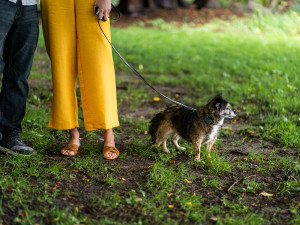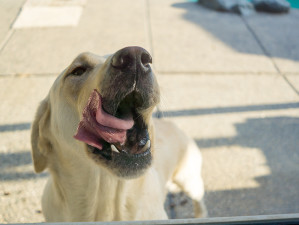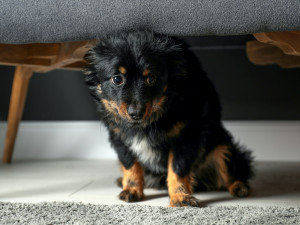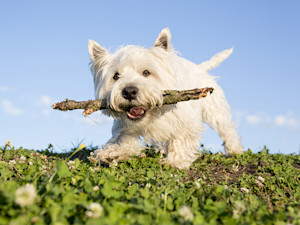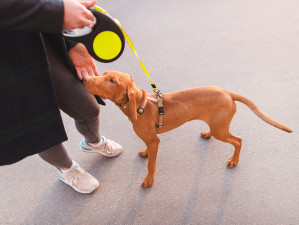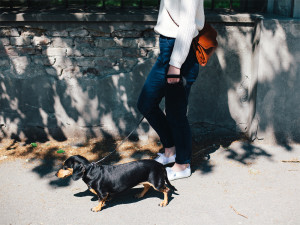SOS: Why Does My Dog Pee When I Pet Them?
Keep the faith; you can fix this pee-action.
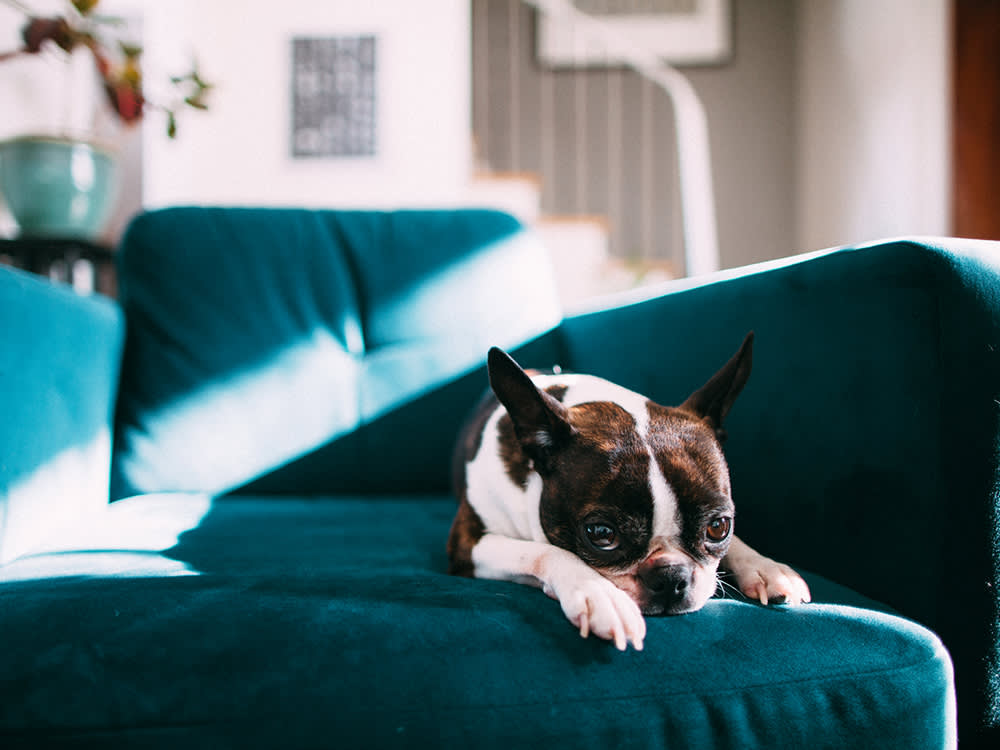
Share Article
When you first brought your adorable little puppy home, accidents were part of life. You also probably got used to wiping up pee so often that you didn’t even bother putting the cleaning supplies back in the cabinet. This especially happened when your friends would come over and lean down to pet your puppy, which triggers the waterworks.
If your dog pees when they are being approached by people or dogs, when they are being greeted and pet, or when they hear loud noises while displaying submissive postures (such as cowering, tucking their tail between their legs, flattening their ears, or rolling), you are probably dealing with submissive urination — and you’re not alone.
Submissive urination is a common and normal problem among puppies. Some dogs who are otherwise completely housetrained release at least some urine during greetings. Contrary to popular belief, submissive urination is not a housetraining problem. It’s a social issue.
When Puppies Pee On The Floor It's Normal
If you have a puppy who pees when you pet them, know that most dogs outgrow this behavior by the time they are a year old. Also, dogs with this issue almost always have lovely, sweet temperaments. So, while the urination can be irritating and a pain to clean up, the fact that dogs greet people or other dogs in this manner actually speaks well of them.

Ironically, when a dog urinates during greetings, they are showing respect for the other dog or person.
What to Do About Submissive Urination In Older Dogs
I recently consulted with a family whose sweet, three-year-old Newfoundland was urinating inside the home. Because their veterinarian could find no medical reason for it, she referred them to me to handle the “housetraining” problem. To many people, house-soiling without a medical cause is always related to housetraining, but behaviorists recognize that many issues involving urination indoors can be signs of appeasement behavior or a need to mark territory, among other possibilities.
Initially, it was challenging to get contextual information from the family about the problem because they just kept saying, “He pees everywhere, and it’s such a mess!” Then, they would detail the clean-up, which was no doubt considerable given that the dog weighed 125 pounds. With persistent inquiry, however, I was finally able to get a fuller picture; it turned out that the dog’s issue was not a housetraining problem.
The dog’s housetraining was solid, but they peed during greetings. As a puppy, they urinated whenever they greeted anyone. But now, they only did it when greeting the husband or the occasional male visitor, especially if the visitor reached for the dog.
Recognizing that the inappropriate urination was a specific type of social issue rather than one of bladder control — or not knowing or caring where it was appropriate to pee — made it easier to address the real issue: the husband’s approach to his sensitive dog. He thought he was doing right by his dog by being firm and applying stern, consistent discipline, but he was open to a new approach.
I was able to help the family by teaching the husband kinder, gentler and more effective ways to interact with his dog and influence the dog’s behavior. As a result, the dog stopped having accidents in the house. No program designed to solve a housetraining problem would have achieved this result, which had the added benefit of improving the overall family dynamic as well.
In short, keep the faith — and keep the cleanup spray handy.

Karen B. London, PhD, CAAB, CPDT-KA
Karen B. London is a certified applied animal behaviorist (CAAB) and certified professional dog trainer (CPDT) who specializes in working with dogs with serious behavioral issues, including aggression. She has written for a variety of magazines including The Bark, Clean Run, and the APDT Chronicle of the Dog, and has published in scientific journals including Behavioral Ecology and Sociobiology, Ethology, Ecology, and Evolution, the Journal of Insect Behavior, and Insectes Sociaux. She is the author of seven books about dog training and canine behavior, including the forthcoming My Dog's Mystery Adventure: And Other Stories From a Canine Behaviorist and Dog Trainer.
Related articles
![Puppy hides under the couch in fear]()
How to Keep Your Dog From Freaking Out When You Have Company
Do these things to help your pup (and your guests) feel chill.
![]()
How I Got Through My Puppy’s Separation Anxiety Days
And survived the yowling, chewing, scratching, etc.
![A puppy outside on a leash]()
How to Potty Train a New Puppy
Tips you’ll want to pay attention to.
![Woman walking her small black dog outside on leash.]()
Do Small Dogs Pee More Often?
Research shows that little dogs may feel the need to scent mark more frequently than big dogs.

